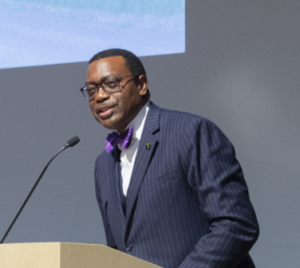The African Development Bank (AfDB) has reported that Africa’s economic recovery remains uneven and fragile, even as the easing of Covid-19 restrictions has put many regions of the continent back on a growth trajectory.
The development finance institution made this observation in its ‘Annual Development Effectiveness Review’, which analyses the Bank’s role in Africa’s development and monitors its contribution to the High 5s: Light Up and Power Africa, Feed Africa, Industrialise Africa, Integrate Africa, and Improve the Quality of Life for the People of Africa.
In the report titled ‘Returning Africa to its Development Path’ 2022 edition noted that the AfDB Group had been pressing ahead with its projects in 2021 despite shutdowns, supply chain disruptions, and a global economic slump.
Specifically, the report indicated that across the continent, the Bank’s investments expanded access to electricity, improved transport, boosted agricultural productivity, fuelled industrialization, and integrated regions, noting, however, that even then economic recovery remains uneven and fragile, even as the easing of Covid-19 restrictions has put many regions of the continent back on a growth trajectory.
The report estimated that continued vulnerabilities and new health measures pushed an additional 30 million Africans into extreme poverty in 2021. By the end of the year, the Bank had spent $4 billion underwriting countries’ efforts to rapidly scale up Covid testing, train health workers, provide households with social support, and supply businesses with finance.
The report also reflected that while the pandemic, and its far-reaching consequences, is not the only crisis facing the continent today, African countries were also grappling with the climate crisis, insecurity in the Sahel and the Horn of Africa, and the impact of the war in Ukraine, particularly its impact on food prices.
In order to address the multi-pronged crises, the report canvassed the need for African governments and their partners to accelerate investments.
The report’s scorecard shows results in every sector. In energy, for example, Bank investments made possible the installation of 294 km of new or improved power transmission lines and 456 km of power distribution lines. As a result, around 1.3 million people received new electricity connections.
In a foreword to the report, the AfDB President, Dr. Akinwumi Adesina, recalled that despite remarkable progress last year, the continent needed more resources now than ever.
He expatiated: “African countries must manage climate change, prepare for future health emergencies, and deal with the prospects of a global food crisis. With just eight years left to achieve the sustainable development goals, we need more ambitious plans for mobilizing resources for Africa’s development.”
The development finance expert charged Africa’s partners worldwide to join the AfDB in embracing a bolder vision for financing the continent’s development, stressing that “Africa will not be defined by challenges, but by its ability to overcome challenges. Together, we will put Africa back on a sound trajectory for resilient growth and development.”






